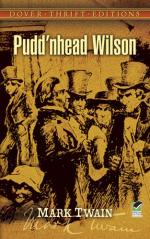“It’s that fickle-tempered, dissipated young goose—poor devil, he find friends pretty scarce today, likely, after the disgrace of carrying a personal assault case into a law-court.”
A dejected knock. “Come in!”
Tom entered, and dropped into a chair, without saying anything. Wilson said kindly:
“Why, my boy, you look desolate. Don’t take it so hard. Try and forget you have been kicked.”
“Oh, dear,” said Tom, wretchedly, “it’s not that, Pudd’nhead—it’s not that. It’s a thousand times worse than that—oh, yes, a million times worse.”
“Why, Tom, what do you mean? Has Rowena—”
“Flung me? No, but the old man has.”
Wilson said to himself, “Aha!” and thought of the mysterious girl in the bedroom. “The Driscolls have been making discoveries!” Then he said aloud, gravely:
“Tom, there are some kinds of dissipation which—”
“Oh, shucks, this hasn’t got anything to do with dissipation. He wanted me to challenge that derned Italian savage, and I wouldn’t do it.”
“Yes, of course he would do that,” said Wilson in a meditative matter-of-course way, “but the thing that puzzled me was, why he didn’t look to that last night, for one thing, and why he let you carry such a matter into a court of law at all, either before the duel or after it. It’s no place for it. It was not like him. I couldn’t understand it. How did it happen?”
“It happened because he didn’t know anything about it. He was asleep when I got home last night.”
“And you didn’t wake him? Tom, is that possible?”
Tom was not getting much comfort here. He fidgeted a moment, then said:
“I didn’t choose to tell him—that’s all. He was going a-fishing before dawn, with Pembroke Howard, and if I got the twins into the common calaboose—and I thought sure I could—I never dreamed of their slipping out on a paltry fine for such an outrageous offense—well, once in the calaboose they would be disgraced, and uncle wouldn’t want any duels with that sort of characters, and wouldn’t allow any.
“Tom, I am ashamed of you! I don’t see how you could treat your good old uncle so. I am a better friend of his than you are; for if I had known the circumstances I would have kept that case out of court until I got word to him and let him have the gentleman’s chance.”
“You would?” exclaimed Tom, with lively surprise. “And it your first case! And you know perfectly well there never would have been any case if he had got that chance, don’t you? And you’d have finished your days a pauper nobody, instead of being an actually launched and recognized lawyer today. And you would really have done that, would you?”
“Certainly.”
Tom looked at him a moment or two, then shook his head sorrowfully and said:
“I believe you—upon my word I do. I don’t know why I do, but I do. Pudd’nhead Wilson, I think you’re the biggest fool I ever saw.”




